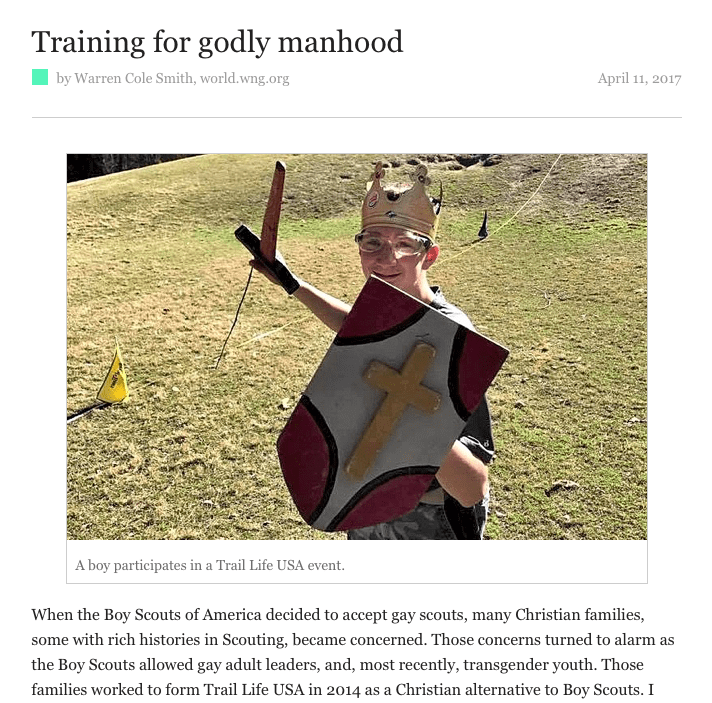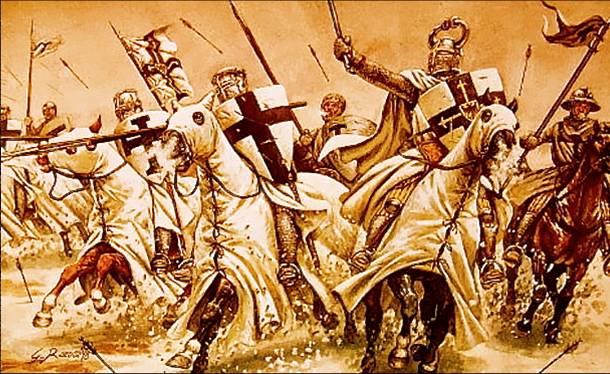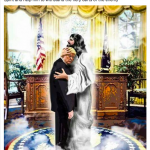I recently came upon this headline and image in World Magazine:

World Magazine is an evangelical publication, marketed as a conservative Christian equivalent to Time Magazine. The article in question is titled “Training for Godly Manhood” and is about Trail Life USA, founded in 2014 as an alternative to Boy Scouts, with a distinctly Christian perspective. (At issue was the Boy Scouts’ decision to permit gay scout leaders.)
Despite the Christian focus of Trail Life USA, I was taken aback by the above photo, which features a young teenage boy brandishing a sword, wearing a golden crown, and holding a shield with a cross on it. The text reads “A boy participates in a Trail Life USA event.” I was unable to ascertain what sort of event it was, but the image brought to mind images of the Crusades.

It is likely that the Trail Life USA event was a reference to the “armor of God” presented in Ephesians 6, and not a reenactment of the Crusades. However, the Ephesians passage makes very clear that the armor is metaphorical, and the New Testament as a whole tends to frown on the use of weapons, even in self defense—and yet the martial pose of the young teen in the image, and the prominent placement of the cross on his shield, feels downright militaristic.
Remember too that the article is ostensibly about godly manhood. An article about godly manhood, in other words, is here illustrated with a militaristic image.
I’m left to wonder whether these images—combined with rhetoric about being a “soldier for Christ” and the “armor of God”—contribute to evangelicals’ support for global military interventions. See this excerpt from a 2006 article:
Recently, I took a few days to reread the war sermons delivered by influential evangelical ministers during the lead up to the Iraq war. …
…
The war sermons rallied the evangelical congregations behind the invasion of Iraq. An astonishing 87 percent of all white evangelical Christians in the United States supported the president’s decision in April 2003. Recent polls indicate that 68 percent of white evangelicals continue to support the war.
These associations are not new. Consider the Battle Hymn of the Republic, which had its origins as a Civil War military song.
Mine eyes have seen the glory of the coming of the Lord;
He is trampling out the vintage where the grapes of wrath are stored;
He hath loosed the fateful lightning of His terrible swift sword:
His truth is marching on.
Christianity has had militaristic associations throughout much of its history. Consider the Crusades themselves, for example. While Europe and the United States ultimately embraced freedom of belief after the bloodshed that followed the Protestant Reformation, the Civil War and even WWI and WWII were frequently endowed with religious imagery, and evangelical religious leaders were quick to draw connections between their religious beliefs and their support of the conflicts.
Some might suggest that all of this is a thing of the past and that the invasion of Iraq was purely a political question—that evangelicals supported the action because their party was in the White House, and not out of religious commitment. However, this division is not so clear. As the 2006 article referenced above notes:
Charles Stanley, pastor of the First Baptist Church of Atlanta, whose weekly sermons are seen by millions of television viewers, led the charge with particular fervor. “We should offer to serve the war effort in any way possible,” said Mr. Stanley, a former president of the Southern Baptist Convention. “God battles with people who oppose him, who fight against him and his followers.” In an article carried by the convention’s Baptist Press news service, a missionary wrote that “American foreign policy and military might have opened an opportunity for the Gospel in the land of Abraham, Isaac and Jacob.”
As if working from a slate of evangelical talking points, both Franklin Graham, the evangelist and son of Billy Graham, and Marvin Olasky, the editor of the conservative World magazine and a former advisor to President Bush on faith-based policy, echoed these sentiments, claiming that the American invasion of Iraq would create exciting new prospects for proselytizing Muslims. Tim LaHaye, the co-author of the hugely popular “Left Behind” series, spoke of Iraq as “a focal point of end-time events,” whose special role in the earth’s final days will become clear after invasion, conquest and reconstruction. For his part, Jerry Falwell boasted that “God is pro-war” in the title of an essay he wrote in 2004.
While some Christian traditions have hewed toward pacifism, evangelicalism is not one of them—and evangelicals’ support for military action is not unconnected from their religious beliefs. These things become intertwined. Evangelical commitment to evangelizing Muslim nations and their belief in the immediacy of the End Times should not be underestimated.
Now certainly, the Boy Scouts has a long militaristic history as well. I suppose what stuck in my mind about the Trail Life USA picture at the top of this article was the combination of religious beliefs and militaristic spirit. We are troubled when this combination is present in Muslim nations—but are we truly willing to examine it in our own nation, and in our own communities? Or do we see ourselves as somehow exempt from the criticism we lob at others?
Trail Life USA involves far more than a dressing up of religious commitment in military imagery. There is camping and a focus on the outdoors and on survival skills, not unlike the Boy Scouts. My criticism is not for Trail Life USA specifically but rather for a wider evangelical community that badly needs to reexamine the alliances and associations it has created. There are conversations that need to take place.
Is Christianity a religion of peace, or one that glorifies war? The picture is rarely this simple, of course. It is possible to believe you support peace while in practice supporting and glorifying war. And perhaps that is where evangelicalism stands today.
I have a Patreon! Please support my writing!















